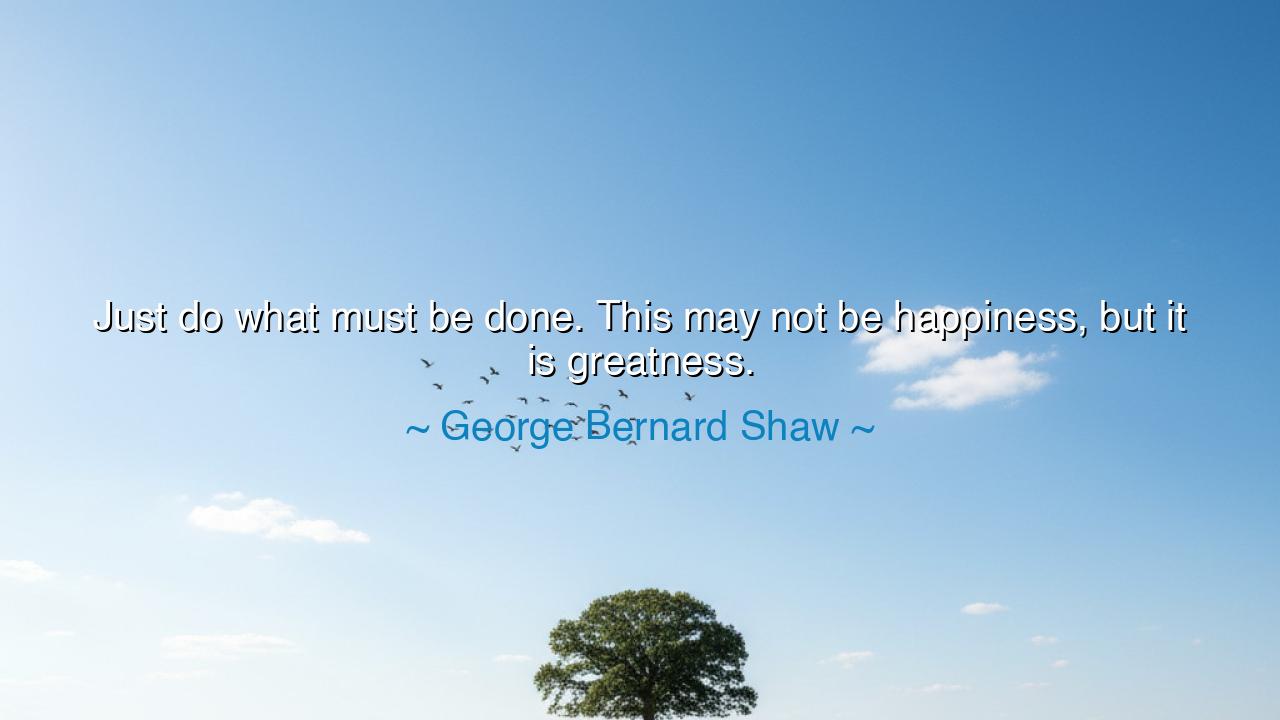
Just do what must be done. This may not be happiness, but it is






When George Bernard Shaw wrote, “Just do what must be done. This may not be happiness, but it is greatness,” he was speaking as one who had seen through the illusions of comfort and the shallow promises of pleasure. His words ring with the strength of duty, the kind that asks not for applause, nor reward, but for resolve. Shaw, the fiery playwright and thinker, understood that there are moments in life when greatness demands that we act—not because we wish to, not because it brings us joy, but because it is right. In that sacred act of doing what must be done, even when the heart rebels, lies the highest form of human nobility.
Shaw, born into poverty in Dublin, knew both struggle and triumph. He labored for years before his words found a stage, and his genius was often misunderstood or mocked. Yet he did not falter. He believed that true purpose was not found in chasing happiness but in fulfilling one’s duty to the truth, to justice, to one’s work. To him, happiness was fleeting—a shadow that dances and vanishes—but greatness endures. It is carved in the soul through sacrifice, effort, and integrity. His quote is not a rejection of joy but a redefinition of it: the joy that comes not from ease, but from the strength to do what is necessary.
The origin of this thought lies deep within the ancient traditions of human wisdom. The Stoics of Greece and Rome, like Marcus Aurelius and Epictetus, taught that the measure of a person is not in what they feel, but in what they do. “Do what is necessary,” they said, “whether it pleases you or not.” To live rightly, they believed, was to live according to duty, not desire. Shaw’s words echo this same eternal law. He calls upon us to stand firm in the face of difficulty, to rise when comfort would have us kneel, to work when the heart longs to rest. This, he declares, is greatness—to obey the voice of conscience when pleasure tempts us away from it.
Consider the story of Florence Nightingale, who, born to wealth and privilege, could have spent her life in ease. But when she saw the suffering of soldiers in the Crimean War, she turned her back on comfort and entered the shadow of disease and death. Night after night, she tended to the wounded, her lamp a beacon in the darkness. She did not seek happiness, but she found greatness. Her hands were weary, her spirit tested, but through her labor, she transformed the practice of medicine and the dignity of care. Her life embodied Shaw’s command: to do what must be done, not because it brings delight, but because it brings meaning.
In these words, Shaw also warns against the modern obsession with pleasure. Too often, we are taught to pursue only what feels good—to seek constant happiness and avoid pain. But the wise know that greatness grows not in the garden of ease, but in the soil of struggle. The mountain is climbed not for comfort, but for the view that only effort can earn. The artist paints through exhaustion; the parent endures sleepless nights for love; the leader bears burdens unseen. These acts may not be happy in the moment, but they are the substance of a life well-lived. The fleeting pleasures of comfort fade, but the quiet glory of duty fulfilled endures forever.
Shaw’s wisdom invites us to redefine our idea of greatness. It is not found in fame or fortune, nor in the easy laughter of untested days. It is found in the moment when a person chooses integrity over advantage, sacrifice over selfishness, truth over convenience. Such choices may not bring smiles—they may even bring pain—but they give life its deepest worth. For it is not the pursuit of happiness that makes one great, but the courage to rise each day and do what is required, even when the soul is weary.
So, my children of purpose and trial, take this teaching into your heart: when life demands of you a task you do not wish to face, do it anyway. When the road is long and others rest, walk on. When the world calls for comfort, choose character. For greatness is not given to those who seek ease, but to those who act with honor when the cost is high. In the quiet strength of such deeds, you will find something greater than happiness—you will find peace, pride, and the immortality of spirit.
Thus, let Shaw’s words be your compass in moments of doubt: “Just do what must be done.” Do it without complaint, without expectation of reward. For in that steadfast obedience to what is right, you will find yourself lifted above the reach of despair. And though happiness may visit you only as a fleeting guest, greatness—born of duty, discipline, and love—will stay with you all your days, and speak your name long after you are gone.






AAdministratorAdministrator
Welcome, honored guests. Please leave a comment, we will respond soon